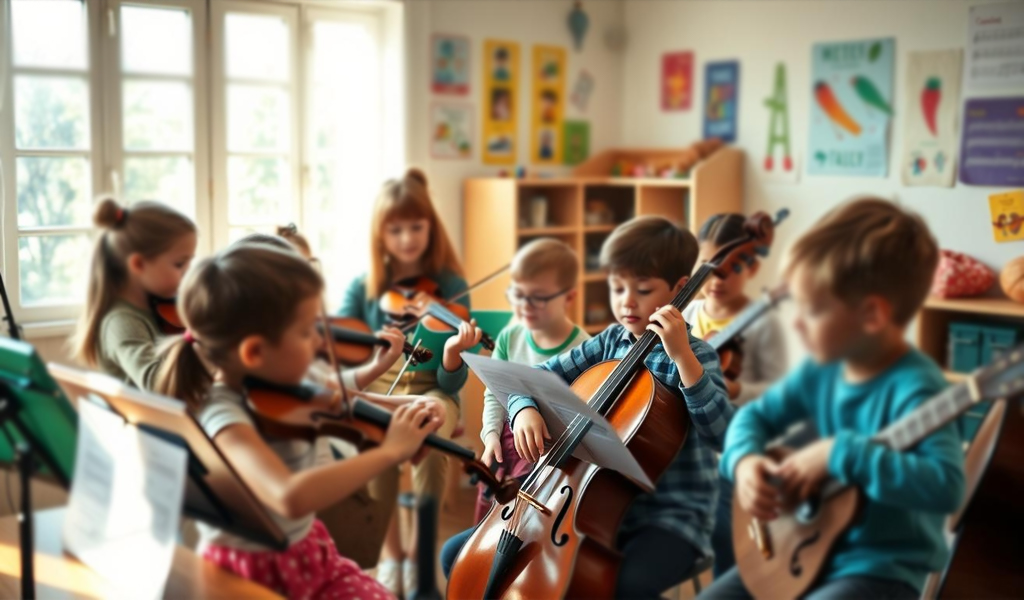
How Learning an Instrument Builds Superpowers in Kids ?
From Strings to Stardom: How Learning an Instrument Builds Superpowers in Kids
If you’ve ever seen a child light up while tapping a drum, strumming a guitar, or singing a simple melody, you’ve witnessed the magic of music. But what if we told you that music isn’t just magic—it’s a superpower that shapes young minds and hearts in the most extraordinary ways?
In today’s fast-paced digital world, learning a musical instrument offers kids a beautiful escape—a chance to slow down, listen, feel, and grow. Here’s how picking up an instrument can turn any child into a real-life superhero.
?
???? 1. Music Builds Brainpower
Learning to play an instrument is like a full-body workout for the brain. It activates both the left and right sides of the brain, helping with:
• Improved memory and concentration
• Better mathematical and reading skills
• Enhanced problem-solving and creativity
Children who play instruments tend to perform better academically—not because they’re studying more, but because music trains the brain to focus and process information efficiently.
?
???? 2. Confidence, One Note at a Time
Mastering even a simple song gives children a sense of accomplishment. Every time they learn a new chord or beat, they grow more confident in their abilities.
Performing, even for a small group at home, teaches them to handle stage fear and build self-esteem—life skills they’ll carry forever.
?
???? 3. Discipline Disguised as Fun
Let’s be honest—learning an instrument takes time and practice. But it also teaches patience, perseverance, and goal-setting.
And the best part? Kids don’t even realize they’re building discipline because they’re having so much fun.
?
???? 4. Emotional Growth Through Music
Music gives children a safe way to express feelings—joy, sadness, excitement, or frustration. It helps them develop emotional intelligence and empathy, especially when playing in groups or ensembles.
?
? 5. Real Kids, Real Stories
Take 10-year-old Arya, who was shy and struggled with speaking in front of people. After a year of learning the keyboard, she confidently performed in her school talent show—something her parents never imagined possible.
Or Kabir, who struggled with attention in class but found focus and calm through learning the tabla. Now, he’s leading rhythm circles at school events.
?
???? 6. Picking the Right Instrument
Every child is unique—and so is their musical path! Here’s a simple guide to help match personalities with instruments:
Personality Type Suggested Instrument
Energetic & Curious Drums, Cajon, Djembe
Gentle & Thoughtful Violin, Piano
Expressive & Bold Guitar, Keyboard
Loves Patterns Tabla, Xylophone
Let your child try different sounds—sometimes, it’s love at first strum.
?
???? 7. Practice Can Be Play
Kids don’t want routines—they want adventures. Here’s how to make practice exciting:
• Use music apps with interactive lessons
• Set mini challenges (e.g., play this song with eyes closed!)
• Turn family time into jam sessions
• Give stickers or stars for consistency
Make a game of growth, and music will become a joyful habit.
?
???? Bonus: Download the “My First Practice Journal”
To help your child begin their musical journey, we’ve created a fun, printable Practice Journal. It lets them track their progress, doodle their feelings, and celebrate their milestones.
[Download Here – Coming Soon]
?
???? Final Note: Every Child Deserves a Stage
Whether your child becomes a concert pianist or just plays lullabies at home, the gift of music will last a lifetime. It will teach them more than melody and rhythm—it will teach them resilience, beauty, connection, and joy.
So put an instrument in their hands, and watch them grow. ????


